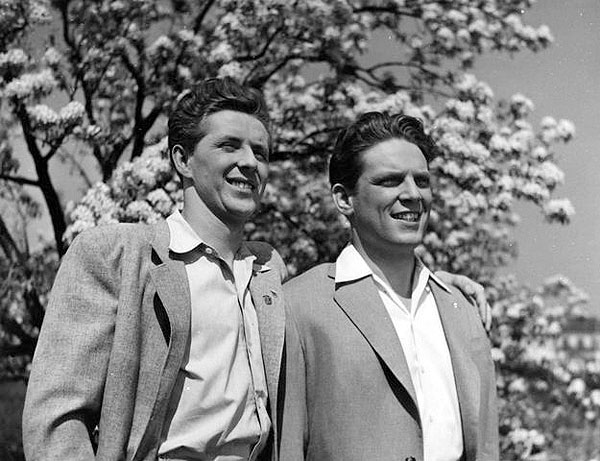Reżyseria:
Vladimír VlčekZdjęcia:
Václav HuňkaMuzyka:
Ludvík PodéšťObsada:
Zdeněk Buchvaldek, Eva Kubešová, Miloš Nesvadba, Marcela Martínková, Jiří Vala, Jiří Adamíra, Pavel Šmok, Ludmila Vendlová, An Son-Chi, Jaroslav Hrkal (więcej)Recenzje (2)
A road movie about the path to a new culture, a new folklore, and a new person. For its time a relatively daring attempt to create a socio-realistic musical purely on the basis of folk dance and singing performances. In the film, the screenwriters and the director quite possibly inadvertently offered an accurate map of the mythology of the 1950s, into which fit all the key themes and which is shaped by all the typical ideological mechanisms. The fact is that my initial disgust from the film was replaced by something akin to respect for its portrait of the time period... From my point of view, it is not a party spew created by hired slaves, but a very authentic capturing of the pathos of the young generation, which saw the ideal of the New World in the years to come. Today, on several occasions I look for traces of the past in Tomorrow, People Will Be Dancing Everywhere with interest, because this film about the essence of communist ideology has much more to say than all the new judgments of contemporary viewers; viewers who hardly ever realize that they hysterically condemn the mechanisms of manipulation in Tomorrow, People Will Be Dancing Everywhere to which they themselves willing to submit every day.
()
(I’ve seen it a zillion times, also in the movie theater). Some people smile with happiness at Casablanca, others like to have a drink now and then at the 3rd World Festival of Youth and Students in 1951, which was attended by some 26,000 delegates from a total of 104 countries. Long live the students of Ethnography and their loved ones! Rozárka, I hope you will invite me to the wedding too. :D "We want peace!" "So do we!" After the 12th rerun, I have once again delved so deeply into the secrets of this film in which nothing happens that I feel blissful. Alena loves An Son-Chi and Pavel loves Alena, but the most possibilities are provided by his union with Mirek (he is a reliable boy, he thinks in terms of five-year plans). Lojza wants Rozárka, but she succumbs to the gossip of the villain Rudy, who is jealous of his unfaithful Ota. Ota is worried about Jan and Hanka is acting like a star, which is a bourgeois throw-back. And what did Věra have to say about it? Isn't she the main obstacle to Ota's love for Hanka and Rozárka's love for Lojza? Which is closer to Korea, Moscow or Prague? Were the creators of Crocodile Dundee inspired by this film? Or is finding love in a crowd just a classic metaphor? It's a good thing that the films belong to the people and that future generations won't be deprived of anything because I simply couldn't bear to see such injustice.
()

